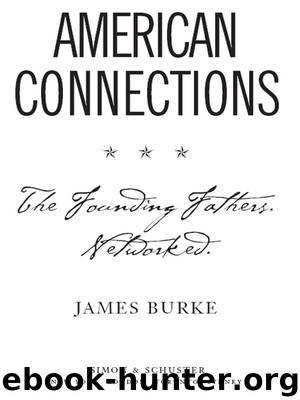American Connections by James Burke

Author:James Burke
Language: eng
Format: epub
Publisher: Simon and Schuster
Published: 2007-07-15T00:00:00+00:00
CHAPTER THIRTY-TWO
Samuel Chase
SAMUEL CHASE (MD) was thirty-five. And either a “universally despised…foul-mouthed rabble-rouser” or a man of “energetic eloquence.” On the day of the Declaration vote this lawyer arrived in Philadelphia after a hundred-mile dash from Maryland where he had just persuaded the Assembly to reverse its opposition to Independence.
After working on thirty revolutionary committees, Chase left Congress accused of insider-dealing in the flour market. This didn’t prevent him from being appointed to the U.S. Supreme Court in 1795. Where after launching a political attack from the bench on Jefferson (Chase thought the Republicans would let the country be ruled by “mobocracy”) he was impeached. And then aquitted.
Back in 1783 Chase had acted for Henry Harford in the latter’s attempt to regain the lands he had lost during the Revolution. The acreage in question was no less than the whole of Maryland, because Harford was the heir (and one of the many illegitimate children) of Lord Baltimore, rake, debauchee, and until lately owner of the colony. The new Maryland Assembly wasn’t about to give back the entire state, so Harford compromised and accepted the lost rental income backdated to his inheritance in 1771. He got the then-colossal sum of one hundred thousand pounds.
Harford’s guardian in 1771 (he was under age at inheritance) was lawyer Robert Morris, who had sucessfully defended Henry’s dad in a scandalous rape case. In 1772 Morris (aged twenty-eight) created his own scandal by eloping with twelve-year-old Fanny, another of Baltimore’s bastards. She then left him. Morris (no surprise, disbarred for immoral behavior) took to the life of a highwayman. In 1785 he married a farmer’s daughter and went straight. Till the wife died four years later, whereupon Morris headed off for India. Where the local judges wouldn’t let him practice so he went round the jails urging prisoners to revolt and escape.
This was reported in the local rag, Hickey’s Bengal Gazette, written and published by lawyer William Hickey. No angel himself, Hickey was in India because his “propensity to women,” gambling, general unemployability, and numerous scandals obliged his father to get him out of town. In India Hickey set up as a lawyer, started the first English-language paper, had innumerable liaisons with English and Indian ladies, and for thirty years lived a relatively successful professional life. At one point he became clerk to Sir Henry Russell, Calcutta Supreme Court chief justice.
Russell had arrived in Calcutta in 1896 at the age of forty-seven and proceeded to impress all and sundry. Chief exception, the Brit he sentenced to death for burning an Indian’s hut and killing him. On the extraordinary grounds that Indians had the same rights as Brits. Apart from this Russell did nothing untoward, and when it came time for him to retire he got the usual golden handshake and address of thanks.
Russell’s children’s governess was Frances Burney, who took the job because her father’s virtuosity at the harpsichord didn’t pay the bills. Burney was a literary type with her own personal library of books in Greek, French, Latin, German, and Italian.
Download
This site does not store any files on its server. We only index and link to content provided by other sites. Please contact the content providers to delete copyright contents if any and email us, we'll remove relevant links or contents immediately.
| American Revolution | Civil War |
| US Presidents |
Fanny Burney by Claire Harman(25783)
Empire of the Sikhs by Patwant Singh(22170)
Out of India by Michael Foss(16311)
Leonardo da Vinci by Walter Isaacson(11901)
Small Great Things by Jodi Picoult(6092)
The Six Wives Of Henry VIII (WOMEN IN HISTORY) by Fraser Antonia(4788)
The Wind in My Hair by Masih Alinejad(4423)
The Lonely City by Olivia Laing(4118)
The Crown by Robert Lacey(4104)
A Higher Loyalty: Truth, Lies, and Leadership by James Comey(4031)
The Iron Duke by The Iron Duke(3639)
Millionaire: The Philanderer, Gambler, and Duelist Who Invented Modern Finance by Janet Gleeson(3568)
Sticky Fingers by Joe Hagan(3453)
Alive: The Story of the Andes Survivors by Piers Paul Read(3309)
Papillon (English) by Henri Charrière(3269)
Joan of Arc by Mary Gordon(3256)
Stalin by Stephen Kotkin(3084)
Aleister Crowley: The Biography by Tobias Churton(3019)
Ants Among Elephants by Sujatha Gidla(2923)
